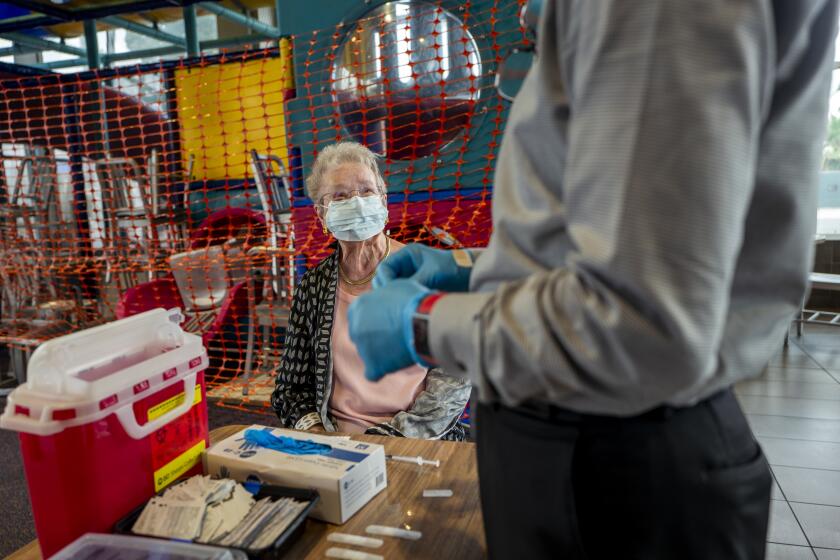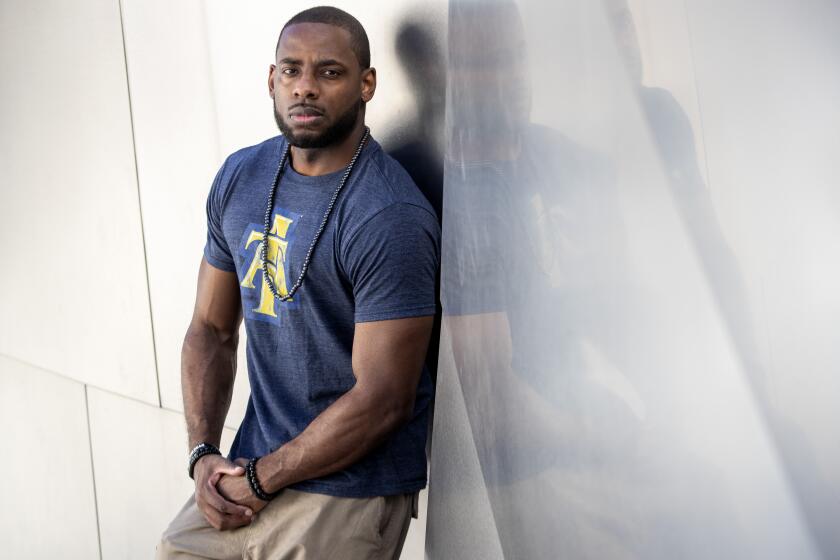At this L.A. County health center, a lawyer is just what the doctor ordered
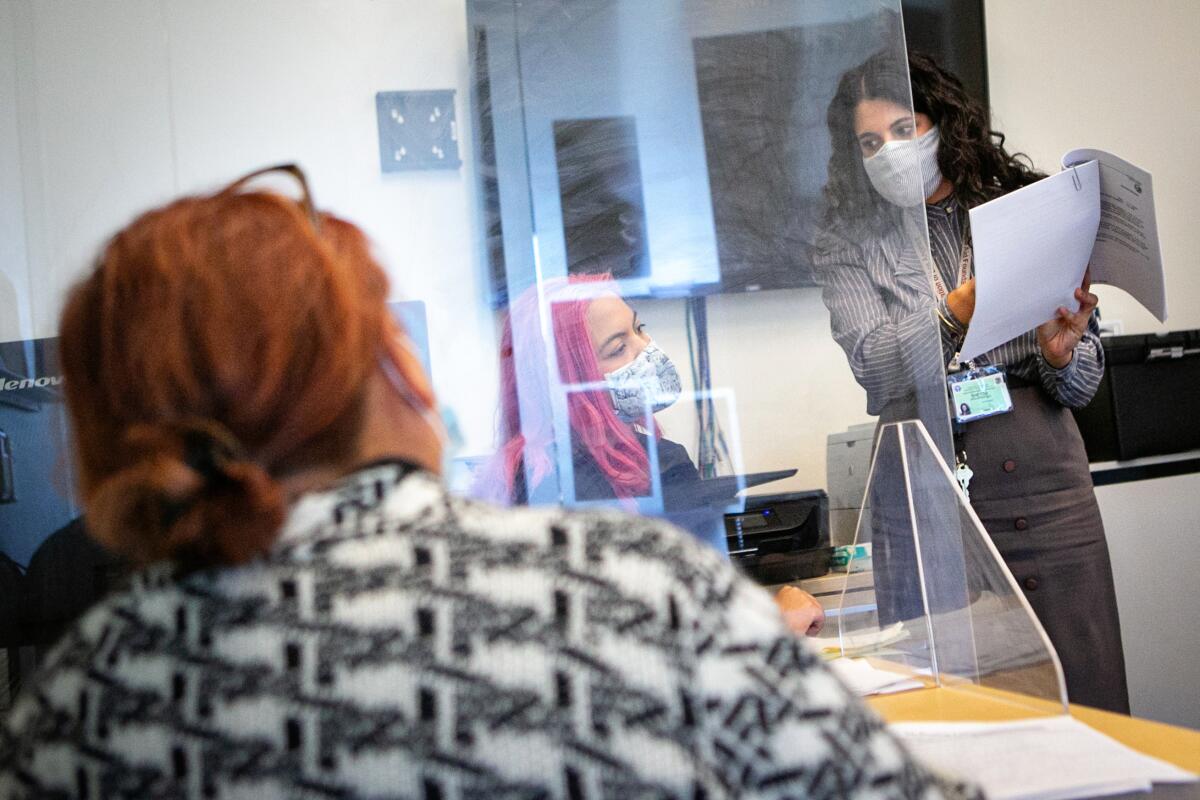
Maria Guadalupe Reyes was worried about the urgent notice that had arrived, saying that her landlord was seeking to evict her from the house she rents.
So she went straight to the usual place: the Martin Luther King Jr. Outpatient Center.
There, the 72-year-old handed the document over to paralegal Alejandra PatlĂĄn â a familiar face with pink hair and an unflappable manner â and waited outside the little room on the second floor for her turn with the attorney.
The glassy center on 120th Street in Willowbrook, where patients typically stop in to see doctors and get hearing tests, vaccinations and other routine care, might seem like an odd place to seek legal advice.
But the L.A. County Department of Health Services, which runs this and other medical centers across the county, has offered free help from attorneys as an unconventional way to meet the broader needs of its patients.
It now has nine clinics with a lawyer embedded on-site through a program called the Medical Legal Community Partnership. Patients can also get legal help by phone or through online referrals.
At the MLK Jr. Outpatient Center, a team from the Legal Aid Foundation of Los Angeles meets with patients on-site on Tuesdays and takes phone calls during the week, fielding a grab bag of questions about immigration matters, health insurance, government benefits, shoddy housing and other issues.
California health authorities, fearing another winter coronavirus wave, are urging all eligible adults to get COVID-19 booster shots.
When Reyes stepped inside the little room on the second floor, she clasped her hands in her lap and listened as PatlĂĄn relayed details from attorney Sheyda Joolharzadeh about the pressing deadline to respond. Before Reyes got her eviction notice, the team had already written a letter to her landlord, warning that it was illegal not to accept her rent.
âWe have a plan to help you out, OK?â PatlĂĄn told her in Spanish. âWeâre going to go step by step.â
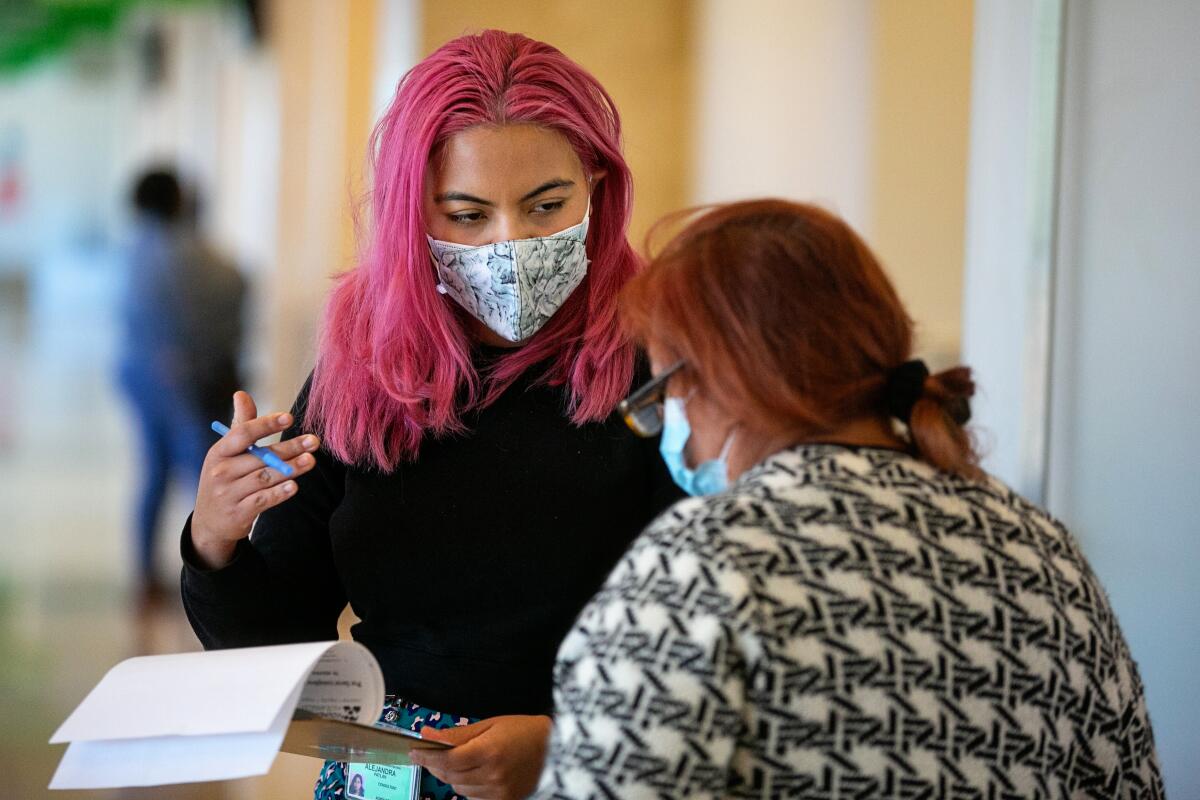
Another woman stopped in after being attacked on the bus. PatlĂĄn talked to her about a possible visa for crime victims, which she cautioned was in high demand. And another patient wanted help with an application for disability benefits. She had spotted the signs advertising free help while she was stopping at the outpatient center for a shot.
Then there was the 68-year-old man battling prostate cancer, who was concerned about mounting medical bills. PatlĂĄn walked him through some options, including a program that provides free treatment for eligible men with the illness. She explained upcoming changes in California law that could help him get better coverage under Medi-Cal.
When PatlĂĄn heard that he was using a Mexican government ID, the paralegal printed out a list of the documents he would need to get a California card, recommending it as a good step to avoid questions about his immigration status if he were ever detained.
Medical officials at the MLK Jr. Outpatient Center said the initiative is tied to their growing focus on âthe social determinants of healthâ â the broader conditions beyond hospitals and clinics that shape how people live and whether they thrive.
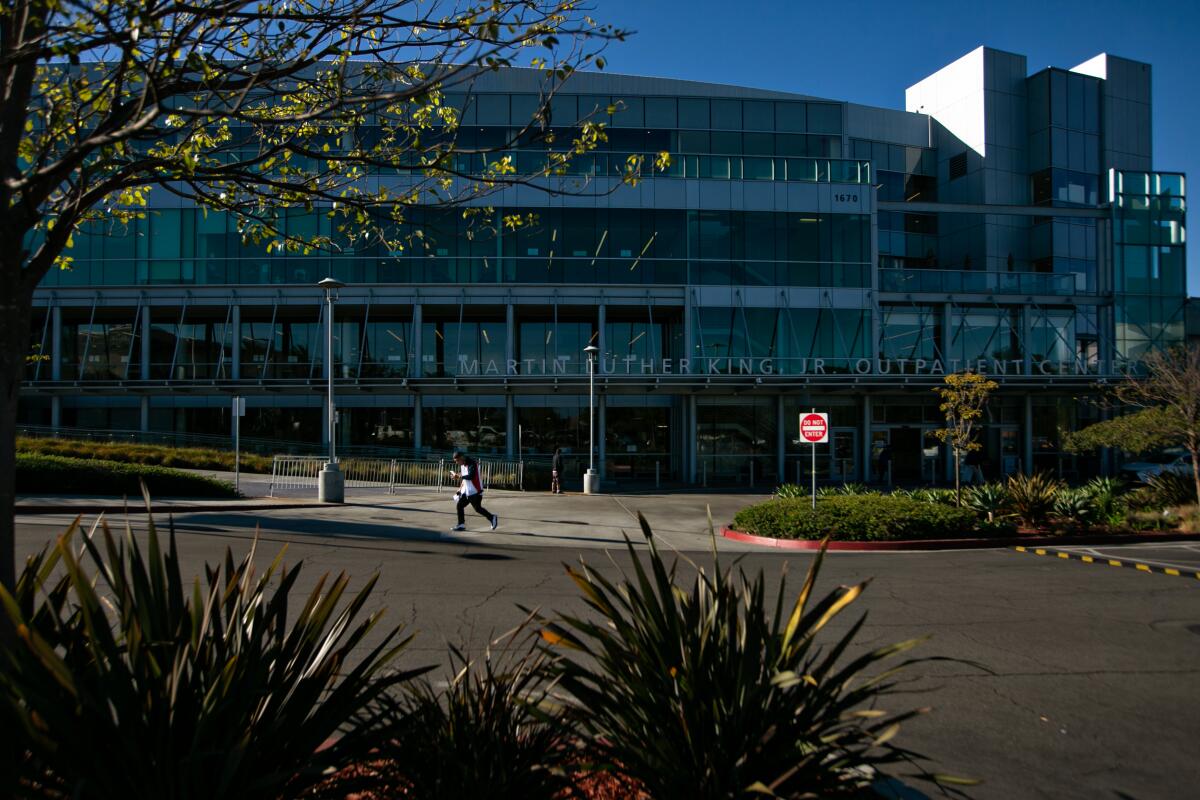
âThe hard truth about medicine is that when you go into an underserved area, the things that make the most immediate impact on health is actually your housing, access to water and sanitation,â said Dr. Ellen Rothman, medical director at the center. For instance, if a diabetic patient âis living in a single room without access to a refrigerator and needs to eat only at McDonaldâs once a day, I can give that patient a lot of insulin and itâs not going to address the main problem.â
Dr. Khanhphong Trinh, the centerâs director of continuity care, recounted the case of an elderly couple getting care at MLK who lived in their car and kept getting tickets that they struggled to pay. The legal team stepped in to help with the tickets and eventually helped get them into housing, which allowed the elderly patients to start focusing on their health needs.
âWhen you start to address some of these bigger needs,â Trinh said, âit complements the healthcare.â
The budget this year for the program was $1.5 million, which includes legal services from several nonprofits â including the Legal Aid Foundation of Los Angeles â that subcontract with Neighborhood Legal Services of Los Angeles County.
Until now, the L.A. County program has been funded through a California program called Whole Person Care, which covers services that would not typically be funded by Medi-Cal to address both medical and social needs.
Whole Person Care is ending at the end of December, with some funding rolling into the next year. As the state shifts to a new system for managing care, the county health department is figuring out how it will fund the medical-legal partnership. So are other California programs that rely on the same program.
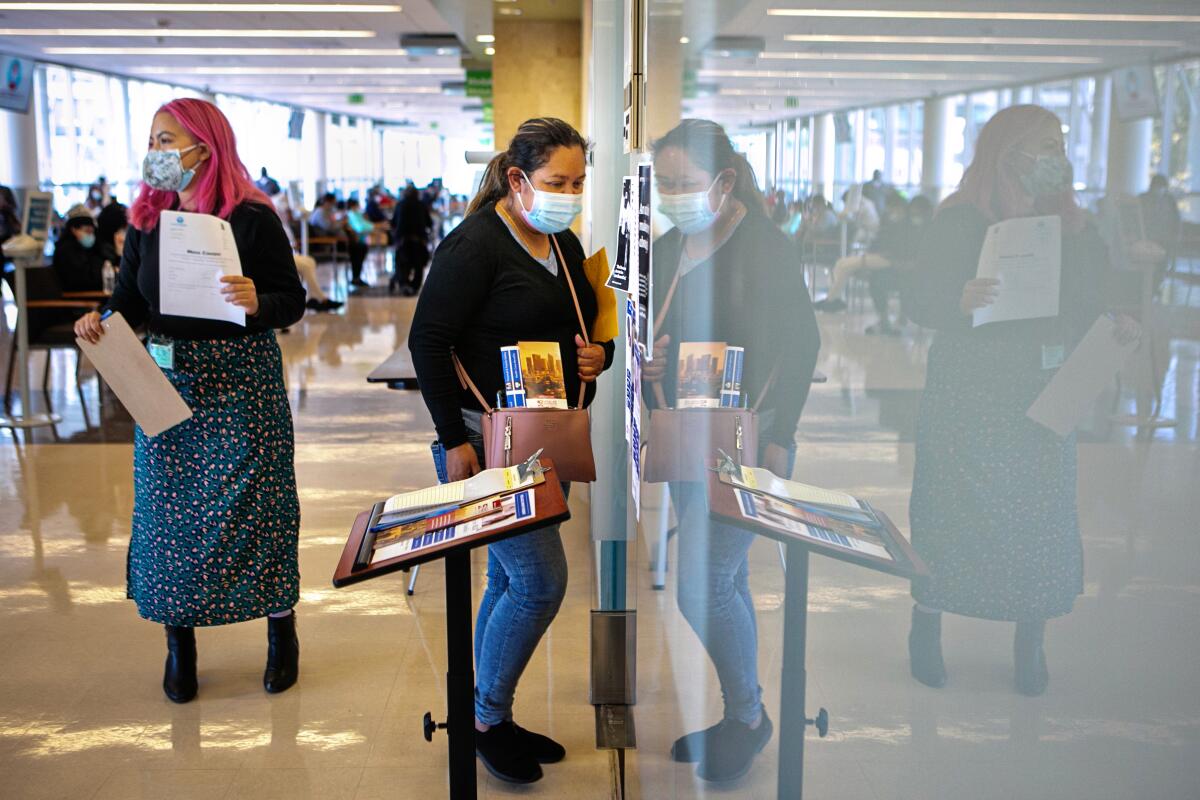
âRight now I donât think anyone has really cracked the code,â said Daniel Nesbit of California Rural Legal Assistance, who is managing attorney for a medical-legal partnership with Monterey County clinics.
Although the upcoming transition has stirred questions, the California Department of Health Care Services said that under the new CalAIM system, medical-legal partnerships will be embedded in other services.
Dennis Hsieh, chief medical officer for Contra Costa Health Plan, said one path could be including lawyers alongside social workers, nurses and community health workers on the âenhanced case managementâ teams for envisioned for patients under the new system.
âItâs making sure that lawyers are seen as â and thus paid for as â an indispensable part of case management,â he said.
The National Center for Medical-Legal Partnership estimates that there are now more than 500 such programs across the country â a huge surge from the roughly 75 programs that existed when the center was created a decade and a half ago.
Funding has been a persistent challenge for such programs, said Bethany Hamilton, co-director of the center. Nearly two-thirds had received money through foundations or other philanthropy, according to an analysis released by the center, but such funding often has an endpoint. Using the kind of money that L.A. County has tapped is relatively unusual.
Historically, the U.S. healthcare system hasnât been focused on the âupstream drivers of healthâ that medical-legal partnerships address, said center co-director Joel Teitelbaum, a professor of health policy and law at the George Washington University.
âItâs really a sick care system rather than a healthcare system,â Teitelbaum said. âMaking that shift is a huge matter.â
UCLA is still assessing the program underway in L.A. County, but such efforts have widely been credited with improving health outcomes: Asthma patients who got legal help forcing their landlords to clean up mold and clear out roaches were less likely to be hospitalized, one study found. Another study found that veterans in such programs in Connecticut and New York saw significant improvements in their mental health.
In L.A. County, health officials say the legal assistance helped a teacher get thousands of dollars in unemployment benefits she was initially denied; enabled a patient to get a power wheelchair that had been erroneously denied by his health plan; gotten astronomical bills covered through Medi-Cal and Medicare; and ensured tenants could avoid eviction and stay in their homes.
Having an attorney stationed in a clinic makes it more likely that people will get that help, because âmany people donât realize that the issues theyâre facing are legal issues,â Joolharzadeh said. For instance, she said, a patient who comes in coughing might not connect that to black mold in their apartment or realize they have legal rights to get that mold removed.
Nearly a third of cases in the L.A. County programs are tied to issues with public benefits, followed by concerns about immigration, housing issues, and health coverage. More than 6,000 people have been referred to the program since it started three years ago. Some hear about it from doctors. Others learn from community groups. And some spot it at the clinic.
Vaccination rates are up, but thereâs fear Black and Latino men will continue waiting until they almost die from COVID-19 or watch people they know die before getting vaccinated.
âWeâre now embeddedâ on-site, said supervising attorney Gerson Sorto, who oversees the Medical Legal Community Partnership program with Neighborhood Legal Services of L.A. County. âThereâs a universe of people that would not be able to seek and access legal help that â because of this setup â are able to.â
Rothman said it has also shifted relationships between physicians and patients. It used to be that âyou just wouldnât ask patients about certain things ⌠because it was so limited what you could do,â Rothman said. âItâs hard to have people open up about a level of need, and then say, âI canât do anything to help you with that.ââ
Attorneys have also helped advise physicians make sure that they provide eligible patients the right paperwork to secure benefits to which they are entitled. Rothman said she was still haunted by a case earlier in her career, in which she tried to write a letter to help a single mother with lupus qualify for disability benefits. The woman got turned down.
Rothman later realized her letter hadnât addressed the specific criteria needed by the government agency. Legal issues âare the one thing youâre super unprepared to deal with when you come out of medical school,â she said.
Weeks after she headed to the MLK Outpatient Center with her eviction paperwork, Reyes had a court hearing. Joolharzadeh said Legal Aid Foundation attorneys successfully argued that the eviction case should be rejected because of pandemic restrictions on evictions.
For now, the attorney said, the 72-year-old is staying in her home.
More to Read
Sign up for Essential California
The most important California stories and recommendations in your inbox every morning.
You may occasionally receive promotional content from the Los Angeles Times.
